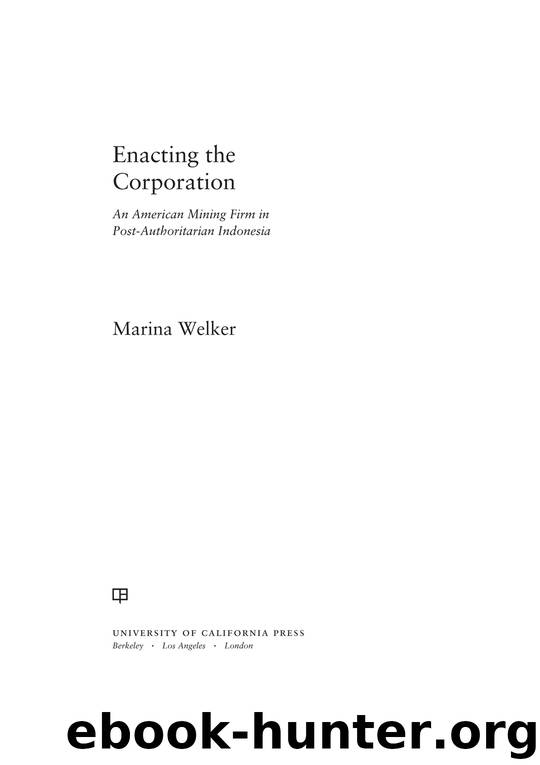Enacting the Corporation by Welker Marina;

Author:Welker, Marina;
Language: eng
Format: epub
Publisher: University of California Press
MATERIAL MICROPOLITICS
Many critics of participatory development have viewed it as an insidious process for remaking subjects, a process ultimately embedded in relations of power that go largely unremarked by facilitators and participants.20 The analytic burden of such critiques then becomes the revelation of insidious relations of power supposedly concealed from those taking part. Several critics have lauded resistance on the part of participants but portray it as intermittent, unconnected, unsystematic, fugitive, deviant interruptions.21 In my research, by contrast, I found resistance to the training and the lessons they were supposed to impart to be widespread and systematic. I devote this section to analyzing this resistance, attending to how it often appears in a material register that may be neglected in studies focusing on interiorized transformations of subjectivity. I do not attach an a priori positive valence to expressions of resistance and critique. As feminist scholars have noted, in resisting one form of authority (e.g., traditional patriarchal power), subjects often assume subordinate roles within other forms of power (e.g., state or capitalist authority; Abu-Lughod 1991; Ong 1987). In this case, I show that resistance to participatory programs was not necessarily politically progressive and could in fact be rooted in a desire to foster closer relations with Newmont or to defend ideologies central to the Green Revolution and legacies of Soeharto’s New Order rule.
Critics have correctly pointed out that participatory development models tend to suppress and deny hierarchies and relations of power within trainings and among community members. I found that participants themselves were acutely attuned to how the trainings were related to—indeed, enacted—broader relations of power. At a basic level, participants expressed this concern by publicly estimating how much the trainings must cost and how the budget was allocated, factoring in the wages of facilitators, honoraria for participants, supplies, and daily meals and snacks. Some speculated that the facilitators inflated participant rosters to extract more money from the company. Participants also complained about the quality of the food, with some voicing suspicion of foul play on the part of the (usually Javanese) caterers, perhaps in collusion with the training’s organizing committee. This kind of conflict was not limited to corporate-sponsored events. In post-Soeharto Indonesia, suspicions about corruption (and phenomena like faked and inflated participant rosters and even billings for facilities rentals and refreshments for nonexistent trainings) were rampant. A teacher who attended a government-sponsored training on the neighboring island of Lombok told me that he and others had banded together to expose the training committee’s misappropriation of snack funds, leading to a melee that left one committee member with a bleeding head wound.
A participant asked in one training how much he and his fellows might expect to earn in honoraria (uang duduk, lit. “sitting money”) for their participation. A Newmont facilitator responded by ribbing them about their “cash obsession,” at which a generally mild-mannered Sumbawan farmer sharply retorted, “Don’t always oppress us!” Another facilitator attempted to defuse things by suggesting that they carry on with the training, promising he would later whisper the sum into the farmer’s ear.
Download
This site does not store any files on its server. We only index and link to content provided by other sites. Please contact the content providers to delete copyright contents if any and email us, we'll remove relevant links or contents immediately.
| Alternative & Renewable | Drilling Procedures |
| Electric | Fossil Fuels |
| Mining | Nuclear |
| Power Systems |
Whiskies Galore by Ian Buxton(40304)
Introduction to Aircraft Design (Cambridge Aerospace Series) by John P. Fielding(32332)
Small Unmanned Fixed-wing Aircraft Design by Andrew J. Keane Andras Sobester James P. Scanlan & András Sóbester & James P. Scanlan(32137)
Craft Beer for the Homebrewer by Michael Agnew(17440)
Turbulence by E. J. Noyes(7033)
The Complete Stick Figure Physics Tutorials by Allen Sarah(6632)
Kaplan MCAT General Chemistry Review by Kaplan(6045)
The Thirst by Nesbo Jo(5779)
Bad Blood by John Carreyrou(5763)
Learning SQL by Alan Beaulieu(5400)
Weapons of Math Destruction by Cathy O'Neil(5032)
Man-made Catastrophes and Risk Information Concealment by Dmitry Chernov & Didier Sornette(4729)
iGen by Jean M. Twenge(4695)
Digital Minimalism by Cal Newport;(4512)
Life 3.0: Being Human in the Age of Artificial Intelligence by Tegmark Max(4495)
Audition by Ryu Murakami(4092)
1,001 ASVAB Practice Questions For Dummies by Powers Rod(4034)
Electronic Devices & Circuits by Jacob Millman & Christos C. Halkias(4021)
Pale Blue Dot by Carl Sagan(3997)
